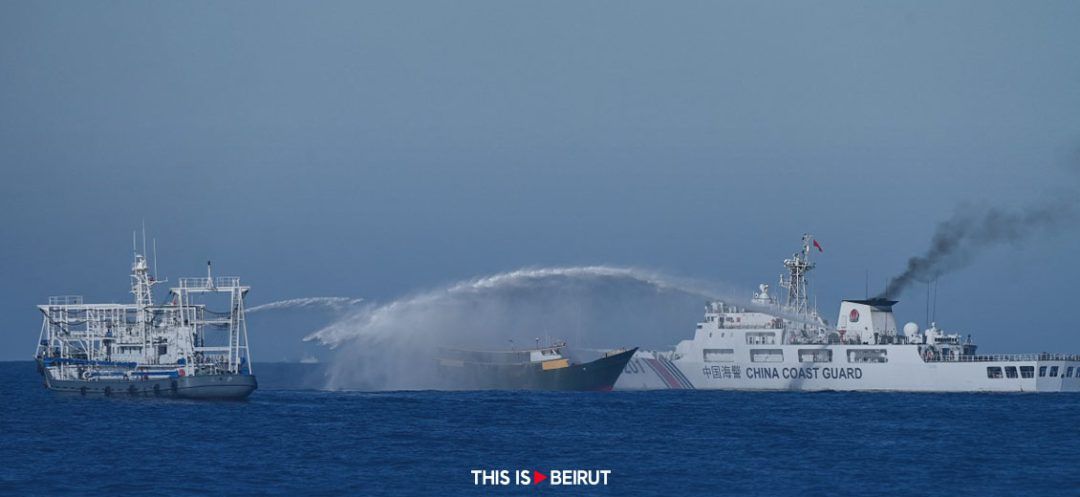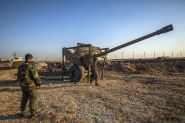- Home
- Middle East
- Tensions Increase Following Chinese-Philippines Confrontation

©(Jam STA ROSA, AFP)
Tensions simmer in East Asia following confrontations between China and the Philippines in the South China Sea on Wednesday. This follows China's decision to increase its defence spending and drop reference to “peaceful reunification” with Taiwan.
Southeast Asian and Australian leaders on Wednesday warned against actions that “endanger peace” in the South China Sea, following fresh confrontations between Beijing and the Philippines in contested waters.
Simmering tensions in the trade corridor threatened to boil over this week, when Chinese boats in the Spratly Islands were accused of hounding Philippines vessels.
The Chinese vessels were involved in two separate collisions, the Philippines coast guard said, and blasted one of the boats with a water cannon.
Images taken in the aftermath showed the water cannon had shattered windows on the control bridge of one of the Philippine vessels.
China claims almost the entirety of the South China Sea as its own, ignoring legal precedents and competing claims from a host of Southeast Asian nations.
Bound to act by consensus, the ASEAN forum has long struggled to make inroads on the overlapping claims staked throughout the South China Sea.
But the fraught atmosphere hanging over the region has some nations now pushing for the bloc to take a firmer stance against increasing Chinese assertiveness.
China announced Tuesday it would boost its defense spending in 2024. The 7.2 percent increase was announced at the start of the annual meeting of the country's rubber-stamp parliament, the National People's Congress (NPC).
China will spend 1.665 trillion yuan ($231.4 billion) on defence in 2024, according to the budget report that lays out the government's financial plans for the year ahead.
China has the world's second-largest defence budget behind the United States, although China's military spend is around three times smaller than Washington's in recent years.
The country's expenditure on its armed forces has been on the rise for decades, broadly in line with economic growth, but its defence expansion is viewed with suspicion by Washington, as well as other powers in the region including Japan, with which Beijing has a territorial dispute over islands in the East China Sea.
China's boost in spending is also a cause for concern for self-ruled Taiwan, which Beijing says is part of its territory to be claimed by force if necessary.
With AFP
Southeast Asian and Australian leaders on Wednesday warned against actions that “endanger peace” in the South China Sea, following fresh confrontations between Beijing and the Philippines in contested waters.
Simmering tensions in the trade corridor threatened to boil over this week, when Chinese boats in the Spratly Islands were accused of hounding Philippines vessels.
The Chinese vessels were involved in two separate collisions, the Philippines coast guard said, and blasted one of the boats with a water cannon.
Images taken in the aftermath showed the water cannon had shattered windows on the control bridge of one of the Philippine vessels.
China claims almost the entirety of the South China Sea as its own, ignoring legal precedents and competing claims from a host of Southeast Asian nations.
Bound to act by consensus, the ASEAN forum has long struggled to make inroads on the overlapping claims staked throughout the South China Sea.
But the fraught atmosphere hanging over the region has some nations now pushing for the bloc to take a firmer stance against increasing Chinese assertiveness.
China boosts defense spending
China announced Tuesday it would boost its defense spending in 2024. The 7.2 percent increase was announced at the start of the annual meeting of the country's rubber-stamp parliament, the National People's Congress (NPC).
China will spend 1.665 trillion yuan ($231.4 billion) on defence in 2024, according to the budget report that lays out the government's financial plans for the year ahead.
China has the world's second-largest defence budget behind the United States, although China's military spend is around three times smaller than Washington's in recent years.
The country's expenditure on its armed forces has been on the rise for decades, broadly in line with economic growth, but its defence expansion is viewed with suspicion by Washington, as well as other powers in the region including Japan, with which Beijing has a territorial dispute over islands in the East China Sea.
China's boost in spending is also a cause for concern for self-ruled Taiwan, which Beijing says is part of its territory to be claimed by force if necessary.
With AFP
Read more



Comments